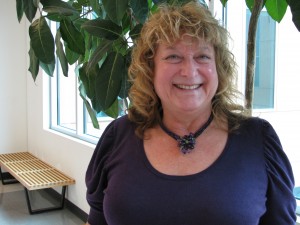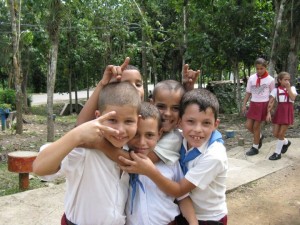During her visit to Cuba this past October, Dale Mueller was surprised by many cultural aspects that belied popular beliefs about the communist nation. While participating in a humanitarian effort administered through a faith-based NGO and approved by the Cuban government, the associate professor of nursing at California State University, Dominguez Hills was continually impressed by an unanticipated spirit of community. She says that in the cities of Havana, Trinidad de Cuba, and Cienfuegos, friendly interactions between everyone from longtime neighbors to foreign visitors was a common thread.

“Everyone was extremely open,” Mueller recalls. “People you would meet sitting at a restaurant or at a bus stop [were] very open to talking with you and sharing their experiences, their views. There was a lot of … openness to talking with foreigners.”
Mueller found that even the typically isolated environment of a “cyber-café” –in Cuba’s case, the telephone company is where people without Internet access at home go–became another venue for interpersonal connections.
“When we went to log on to the computers, it was always on somebody’s Facebook page,” Mueller notes. “You could see that people were using it [Facebook] to communicate. And people were coming in socializing. If one person made a type of bread, she would bring it in and share it with the people who worked there. If they had visitors, they’d bring them in and introduce them around.”
Mueller says that the relationships between neighbors contrasted with the more transient nature of urban living in the United States. Members of a community who benefit from the government’s provision for basic needs such as housing and food “give back” by taking care of one another in ways that would be atypical in most American cities.
“If you need anything, the neighbors are there to help with things like transportation and babysitting. It’s a much different sense of community. Here, you may wave at your neighbors, but you wouldn’t think of dropping off your three-year-old for a day unless you knew them really well.”
The sense of harmony, Mueller found, was not lost on the younger generation of Cubans. During the group’s visit to a school in Pinar del Rio where they delivered donations of school supplies, teaching aids, and English-Spanish books for young readers, the children demonstrated what Mueller describes as an uncommon collaboration and respect for each other and for visitors.
“Being at the school was one of the most charming experiences we had,” she says. “Kids are very candid and uncensored [with] their behavior. They look very healthy, bright, well-groomed, ready to learn, happy, collegial. A lot of them were kind of hugging each other, walk hand-in-hand, or put their arm around their buddies. They chatted with us, some half English, half Spanish. At that age, they are a little more comfortable speaking Spanish and a lot of the people in our group did, so we could converse.

“As we were making our way back to our bus, one of the [classes] saw us outside,” she remembers. “So they all said in unison, ‘Good afternoon!’ like they were practicing their English.”
Mueller and her colleagues, who were comprised of an assortment of health professionals, academics, and writers, learned about the state of health care in Cuba. Although the national health care system is paid for by the government and treatment is available for everyone, there is a great shortage of supplies and medicines. Faith-based organizations such as the one that organized Mueller’s visit supplement the system with services to serve meals to the homebound elderly, operate an existing leper colony, and work with developmentally disabled children and young adults.
Although Mueller had been aware of the free education system in Cuba, seeing the results of it first-hand really solidified the concept for her.
“If you look at the United Nations data about Cuba, you’ll see that they have about 99 percent literacy in the country,” she says. “Everyone can read, as this is considered a core value in their society, and go to school to learn a trade or advanced degrees. They have a surplus of professionals, including doctors and nurses–that’s one of their major exports, [medical] personnel. They have relationships, particularly in South America, to [send] their professionals to work in those health care systems. The individuals don’t get paid directly but are part of an exchange through the Cuban government.
“Living expenses are provided for those personnel who serve in, for example, Venezuela or Belize in exchange for favorable trade agreements between that country and Cuba,” says Mueller. “Such arrangements provide imports such as food and oil to Cuba in exchange. This arrangement is especially helpful since the breakdown of the USSR and streams of supplies that came from that former relationship.”
Mueller also learned that there were fewer, if any, legislative impediments to solving issues of the environment, since the government itself was focused on finding ways to reduce harmful emissions and grow more sustainable crops.
“I learned that in terms of ecology, they have one of the greenest footprints of any nation in the world today,” she says. “Current research and innovation in agriculture and ecologic sustainability takes place in the universities without the extra step of having to obtain grant funding. These innovations can be easily implemented as pilot projects or large-scale initiatives on farmland that is operated by the government. There are many such projects that match the right industry to the right terrain and communities have become self-sustaining as far as energy and crops.”
Mueller says that Cuba’s vision of a classless society means that everyone has the same resources, no matter what their education level or earning potential is. She was surprised to see however, that the highest earners were performing artists, who often held regular jobs related to their art.
“So we didn’t see the struggling artist as a social phenomenon. We did see people who had jobs and then got involved in singing and performing groups, not for pay, but because what they did during the day was also related to the arts. A piano teacher would be part of the community choir. There was music everywhere… open air concerts [with] everyone selling their CDs.”
An enduring impression that Cuba made on Mueller was the pervading belief throughout the multicultural nation that “They see themselves and each other as Cubans first.”
“Although they may be from a variety of countries ethnically, they see themselves as Cubans first, not Spanish Cubans or Afro Cubans,” she says. “That hyphenated kind of identity doesn’t really exist there.”
Mueller says that the blending of cultures over several generations is reflected in some of the photos that she took at the school she visited.
“Some [of the kids] are blond with green eyes,” she says. “Others look more Latino, while others have more a Balkan or European appearance. There are many from Sub-Saharan Africa.
“I’ve traveled a lot of different places and there is usually one group that stands out as the minority or majority and I didn’t see that at all. Neither did the other people in our group. We chatted about this over dinner. I didn’t want to just be looking out with Pollyanna lenses and saying, ‘Gee, everybody is just one big happy family.’ But they were saying that was their impression as well.”
For more information on the School of Nursing and the College of Professional Studies, click here.